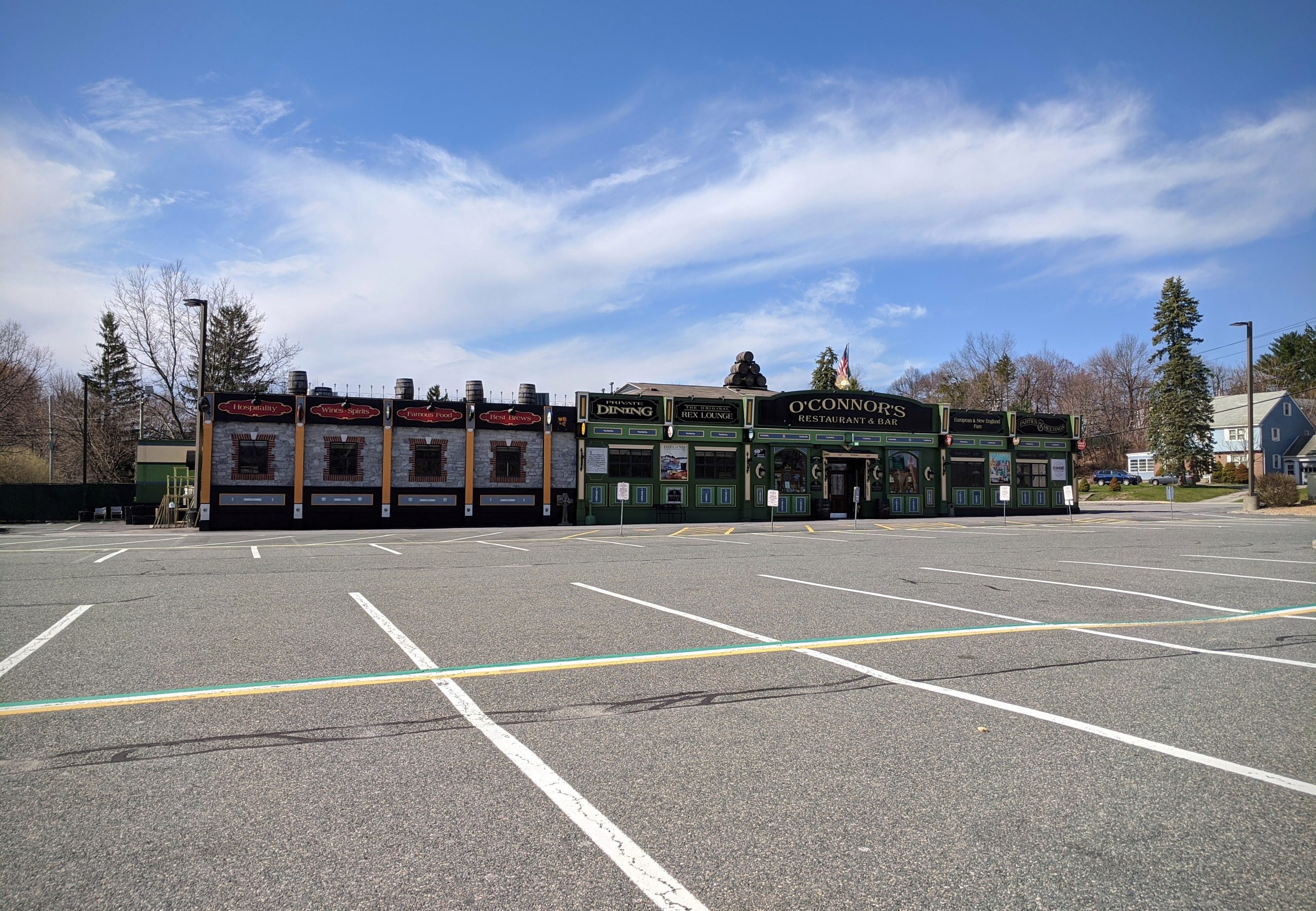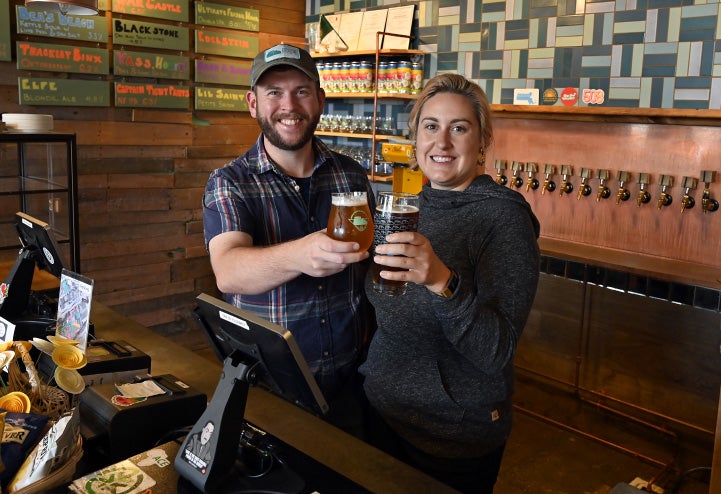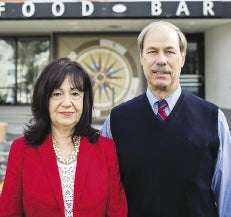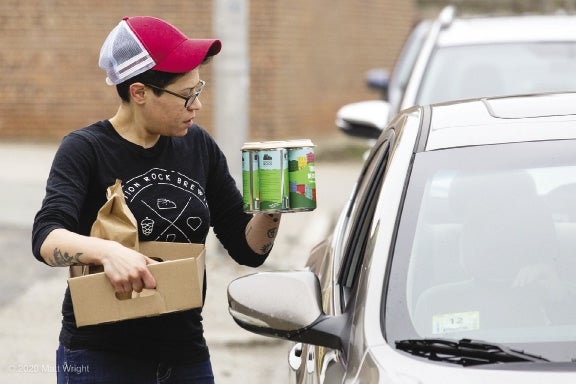The necessity of staying far apart from others has become clear to restaurateurs that habits will likely change long after dine-in eating returns.
Get Instant Access to This Article
Subscribe to Worcester Business Journal and get immediate access to all of our subscriber-only content and much more.
- Critical Central Massachusetts business news updated daily.
- Immediate access to all subscriber-only content on our website.
- Bi-weekly print or digital editions of our award-winning publication.
- Special bonus issues like the WBJ Book of Lists.
- Exclusive ticket prize draws for our in-person events.
Click here to purchase a paywall bypass link for this article.
When Alec Lopez and Sherri Sadowski, the husband-and-wife team behind Worcester restaurant Armsby Abbey, sat down in mid-March to decide whether and how to remain open during the COVID-19 pandemic, they first thought they’d be considering a shutdown of a few weeks.
That, of course, hasn’t been the case. The initial government-mandated closure of non-essential businesses – including restaurant dining rooms and bars – has been extended, in an effort to stem the spread of the coronavirus. And the necessity of staying far apart from others has become clear to restaurateurs that habits will likely change long after dine-in eating returns.
“There were a lot of sleepless nights,” Lopez said.
“We’re still not sleeping,” Sadowski added.
Deciding to stay open was the first step.

Armsby Abbey, which over a dozen years has built a reputation for its hard-to-find beer menu, has never had online ordering. It had to create that capability on its website – but still has to print out and re-enter orders in its in-house system because the two aren’t connected. It could finally offer beer to go, but had no growlers, so it had to tap into its network of brewery friends to stock up.
Before, Sadowski said, “takeout was barely a speck.” Now it’s the only option. Family-style meal options have been added to the menu, as have cocktail kits giving customers the ability to make margaritas, bloody Mary’s and more at home, with everything but the alcohol.

Armsby has paired with the Highland Street ice cream shop WooBerry to create cocktail-inspired ice cream.
“That was an ability to send Armsby vibes home with people,” Lopez said.
Difficult decisions
The same forced creativity – and dilemmas over how to keep business going – is repeated all over Worcester, Central Massachusetts and elsewhere. For restaurants, bars and breweries across the area, the COVID-19 pandemic has forced a difficult question about whether to remain open and if so, how.
Even Worcester’s city officials are illustrative of the mixed priorities.
The city has required all retail workers to wear facial coverings to stay safe. But the City Council has declared April 27 Takeout Day, urging residents to get food from their favorite restaurant that day.
What's undoubtable is that the restaurant industry has been decimated by the outbreak.

Four out of five Massachusetts restaurants have temporarily closed during the coronavirus pandemic, according to a survey by the Massachusetts Restaurant Association.
Of 1,000 restaurant operators, only 20% said they've remained open for delivery or takeout. Nearly half of restaurants, or 45%, said they attempted to continue takeout and delivery only before choosing to close.
"Initially some people tried to do it," Bob Luz, the president and CEO of the Westborough-based restaurant group said. More and more, though, he added, some have decided it best to close entirely for the time being.
Since the outbreak began hitting Massachusetts, 93% of restaurants in the state said they've laid off or furloughed staff, bringing employment down by 87%. Restaurant sales in Massachusetts were down nearly $1 billion in March, and the Massachusetts Restaurant Association projects a $1.3 billion decline in April.
The picture of the industry nationally is bleak as well.
The National Restaurant Association said its survey of more than 6,500 operators found that average sales were down 78% compared to a year ago.
The group estimates more than 8 million restaurant employees, or more than two-third of the usual workforce, have been laid off or furloughed since the beginning of the outbreak in March.

Oriola Koci, who owns Worcester restaurants Altea’s Eatery and Livia’s Dish with her husband, Enton Mehillaj, viewed the decision less as a financial one than one rooted in emotion.
“For my husband and I, this is truly a family business, and the people who work with us are truly part of the family,” Koci said. “When this happened, we wanted to stay open for our staff first.”
Staying open doesn’t bring in enough revenue to pay the bills, she said, but does come with a satisfaction of continuing to provide some jobs and serving meals to the public.
Tom Oliveri gauged his ability to stay open depending on his restaurant.
Peppercorn’s Grille & Tavern in Worcester has a menu more suited to takeout orders, so it has stayed open. So, too, has Prezo Grille & Bar, its sibling restaurant in Milford. Not so for Oliveri’s other restaurant, Civic Kitchen & Drink in Westborough.
“If you’re geared for takeout and delivery, it’s a lot easier,” said Oliveri, who estimated business at about 40% of normal. “It’s allowing me to keep some people employed and paying the utility bills.”
Oliveri isn’t the only one to discard a one-size-fits-all approach.
Worcester’s Funky Murphy’s has closed for now, while sibling city restaurants Scruffy Murphy’s & Quinns Irish Pub have remained open for takeout. Volturno Pizza Napoletana temporarily closed in Framingham but has kept the Worcester one open.
Niche Hospitality Group initially kept open its two Fix Burger Bar locations open, the Worcester location of Mezcal Tequila Cantina, Steam Energy Cafe, Bocado Tapas Bar and Rye & Thyme American Tavern. It initially closed just two locations: the Worcester bar Still & Stir and the Leominster location of Mezcal.
But on April 10, the company said it would close all locations for now to better protect employees and customers.
“There’s no social distancing at a restaurant,” Niche President Michael Covino. “You’re working side-by-side. You can’t do it.”
Covino wanted to keep the Niche restaurants open for what he called seamless operations, continuing to serve the area through the pandemic.
“In the end,” he said, “it was too challenging for us to do that.”
Other restaurants have decided to close entirely for the time being.

That list includes Worcester’s deadhorse hill, O’Connor’s Restaurant & Bar, the restaurant chain 110 Grill, which has eight Central Massachusetts locations, and Flying Rhino of Worcester, which has used the time off to make renovations.
Niche is also planning minor renovations, as is BirchTree Bread Co. of Worcester, which remained open until April 13 and is planning a reopening after a few weeks of what is expected to be the outbreak’s peak.

“With 75% of our team at home, we are running the show with a bare bones crew and wanted to make sure all of us rested and recharged for another span of service come the end of this month,” said Avra Hoffman, who co-owns the cafe with her husband, Rob Fecteau.
Communal gathering becomes impossible
The coronavirus pandemic hit at an unlucky time for the Worcester Public Market, which opened in February with a mix of different food vendors on Kelley Square.
Breweries relying in large part on taprooms with communal tables and relaxed gathering places have mostly remained open while limiting sales for curbside pick-up or even delivery.

At Worcester’s Redemption Rock Brewing Co., CEO Dani Babineau quickly decided to stay open with online orders workers bring out to customers’ cars.
“From there, it was trying to figure out the best way to maximize our ability to make revenue while also giving the customers a good experience and keeping people safe,” Babineau said.
Eventually that meant offering delivery. A brewery employee maps out the most efficient route each day, but that’s not the only challenge. Not everyone wants to open their door for a face-to-face interaction to show their ID, so people have resorted to showing a license through a window or passing it through a mail slot.
Closing wasn’t a realistic option, Babineau said. February had just been the best month yet for the brewery, which opened in January 2019.
“We don’t have the cash reserve to just close and still pay our bills,” Babineau said.
The area’s most established brewery, Westminster’s Wachusett Brewing Co., has also offered both pick-up and delivery.
“It’s certainly not replacing the business model we had previously, but if it allows us to safely employ our staff and provide our local community with something out of the ordinary, well, that’s more important than turning any significant profits,” said Christian McMahan, the brewery’s president.
Expecting uncertainty
Eventually, restaurateurs will have to decide when and how to operate once dining rooms and bars can reopen. Few are sure what that will look like, either.
The Massachusetts Restaurant Association has been working with state legislators to craft a potential industry protection program and has been in touch with the governor's office to figure out an eventual reopening strategy. The restaurant group hopes for a bill to allow eateries to use money now to restock shelves and for hiring back workers once it's safer and more feasible to do so.

Robb Ahlquist, who runs the Worcester Restaurant Group with his wife, Madeleine Ahlquist, is watching Gov. Charlie Baker’s updates each day to gauge when they could reopen. As of April 21, the Massachusetts shutdown of restaurant dining rooms and other non-essential businesses was due to be lifted on May 4, although even if that date isn’t extended, Baker has said businesses would face heavy restrictions when they reopen.
The Ahlquist’s three restaurants – Sole Proprietor, 111 Chop House and Via Italian Table – stayed open for the first week of the new business social distancing guidelines but then decided to close entirely for now, citing health concerns.
“It wasn’t worth it,” Ahlquist said.
The company’s restaurants don’t lend themselves particularly well to takeout, leaving the Ahlquists to analyze their menus to find new opportunities. They, like others, are considering if or whether they should open their dining rooms if, for example, capacity is limited to just 50% or whether customers’ temperatures would have to be taken at the door.
“I don’t know that we’d even want to operate in that capacity,” Lopez, the Armsby Abbey co-owner, said.
Koci expects a year or more to pass until there’s some normality in the business. Covino guesses restaurants would have to be able to operate at at least 50% capacity to be viable.
McMahan, whose Wachusett opened a taproom at the Worcester Public Market in February, expects a long, slow return to normal – unless there are permanent shifts in customers’ behavior.
“The craft beer category has always been over-indexed in the on-premise [consumption] versus domestic and imports and has used the trial-and-sampling behavior that takes place there to build their business and introduce new brands to consumers,” McMahan said, before wondering himself what’s next. “How will craft breweries adjust if the at-home drink occasion continues to remain unusually high, even after the on-premise opens again?”

